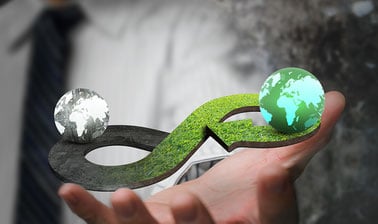- Level Expert
- Ratings
- المدة 24 hours
- الطبع بواسطة Wageningen University & Research
- Total students 2,328 enrolled
-
Offered by

عن
Do you want to contribute to a more sustainable society? Tackle the challenges in the transition towards a circular economy? In this course you will analyse what it takes to create a circular economy including sustainable supply chains.
The transition towards a circular economy is one of the biggest challenges in order to create a more sustainable society. This transition requires circular thinking and an interdisciplinary approach, combining socio-technical, managerial, and environmental considerations.
Right now we design products from cradle to grave: from production to consumption to waste, which is a linear model. But we should design products from cradle to cradle: in a closed loop whereby they don't become waste, but valuable resources again. And when we start thinking in circles, we might as well try to reinvent not just supply chains, but entire systems. Because that's what we have been doing with sustainability: we have been departing from the status quo, while cradle to cradle and circular pushes us to think outside the box.
Cradle to Cradle celebrates abundance; it recognizes that people, just like ants and trees, are abundant and have a large impact on their environment. The challenge is to make this impact a positive one and we invite you to join this challenge!
In the MOOC Circular Economy: An Interdisciplinary Approach, we therefore take a systems approach to the circular economy, considering different stakeholder perspectives, their incentive structures, and their impact on circular alternatives.
The circular solutions will be assessed by using applied, as well as emerging, technologies. You will learn how to use life cycle assessment and agent-based modelling to assess the socio-technical and manageable challenges and environmental benefits of alternative solutions.
Join the MicroMasters Program
This MOOC is part of two MicroMasters Programs, Economics and Policies for a Circular Bio-Economy and Business and Operations for a Circular Bio-Economy.
Both programmes prepare you for the transition from fossil to renewable, biobased resources and consist of 3 courses and a final project; the capstone:
What you will learn
- Understand the concept of a circular economy
- Understand how a circular economy deviates from the current linear system
- Analyse and develop complex circular systems using a systems thinking approach
- Assess the use of Life Cycle Assessment and Agent Based Modelling
- Formulate improvements for a transition towards a circular design
- Learn how to use and apply complexity aspects & agent-based modelling
Skills you learn
Syllabus
Module 1: Introduction to the Circular Economy
In this module, we will investigate how the circular economy is defined, how it deviates from the current so-called "linear" system and how it relates to other sustainable schools of thought. At the end of this module, we hope you will have learned the main principles of the circular economy and the reasons to invest in a transition towards a circular economy.
Module 2: Circular Systems Engineering
In this module, we will introduce you to the concept of systems thinking. A systematic approach to problems and situations is necessary when dealing with complex systems. In addition to implementing this way of thinking, engineering solutions are also needed when closing cycles. At the end of this module, you will know how to apply systems thinking when analysing and transitioning to circularity, and have learned some interesting examples of engineering solutions.
Module 3: Transition Management
In this module, we will discuss how circular changes come about within companies and society. What is needed for businesses to successfully transition towards circularity? What are some useful skills you can develop yourself to help transform industries and your own environment?
Module 4: Life Cycle Assessment (LCA)
In this module, you will learn about the strengths and weaknesses of LCA, and how it can be used to quantify the environmental impact of circular products. After completion of this module, you’ll understand the principles of LCA and know what questions LCA can answer.
Module 5: Agent Based Modelling (ABM)
Agent Based Modelling is a tool that can be very useful when researching circular economy situations. In this module, you will learn what ABM is, how it works and when it can be applied. You don’t have to learn how to program code yourself – but if you want to, you can.
Module 6: Case
The last module contains a case study, in which you will apply everything you have learnt so far.
Auto Summary
Embark on an expert-level journey with "Circular Economy: An Interdisciplinary Approach," a comprehensive course designed for professionals in the Science & Engineering fields. Offered by edX, this course delves into the multifaceted transition towards a circular economy. Learners will explore crucial elements such as economic dynamics, supply chain logistics, social impacts, technical advancements, managerial strategies, and environmental considerations. With a total duration of 24 hours, the course is intensive and thorough, providing substantial knowledge and practical insights. Two subscription plans are available: Professional and Starter, catering to different levels of commitment and expertise. Ideal for those with a background in science and engineering, this course not only enhances your understanding of sustainable practices but also equips you with the skills to implement circular economic principles in various sectors. Join now and lead the charge in transforming our economy for a sustainable future.

Emiel Wubben

Alistair Beames

Gert Jan Hofstede

Dr. Kim Poldner

David Strik

Jan Vreeburg


